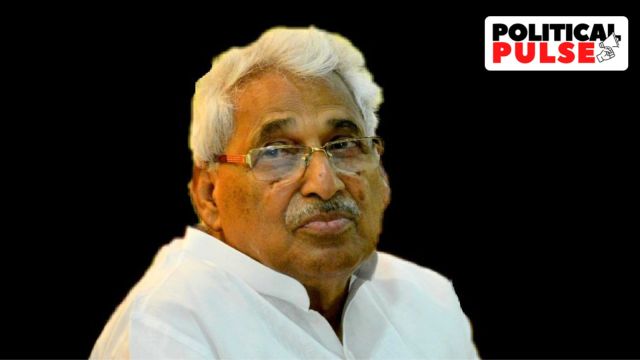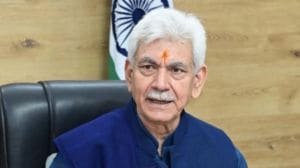‘Even CM Yogi uses Urdu words in speeches… Govt’s mindset is communal. It is not about language’: UP LoP
“English was removed as an official language after a long struggle… It is not just Urdu that I demanded (among languages for translation in House), I requested to include Sanskrit as well,” Mata Prasad Pandey tells The Indian Express.
 Samajwadi Party (SP)'s Leader of the Opposition (LoP) Mata Prasad Pandey. (Photo: X/ @mataprasadsp)
Samajwadi Party (SP)'s Leader of the Opposition (LoP) Mata Prasad Pandey. (Photo: X/ @mataprasadsp)The Uttar Pradesh Assembly witnessed a heated exchange on Tuesday, the opening day of the Budget Session, between Chief Minister Yogi Adityanath and the Samajwadi Party (SP)’s Leader of the Opposition (LoP) Mata Prasad Pandey over the inclusion of English and omission of Urdu among the languages for translation of the Assembly proceedings.
Speaker Satish Mahana announced that live translations would now be available in English and four regional languages – Awadhi, Bhojpuri, Braj and Bundeli.
While the SP members argued that they fought a long battle against the imposition of English, CM Adityanath slammed the SP, saying its leaders send their own children to English medium schools but want others’ children to learn Urdu and become “maulvis” (Islamic clerics).
In an interview with The Indian Express, LoP Pandey, the 82-year-old socialist leader and ex-Speaker, spoke about the row and his party’s stand, among other issues. Excerpts:
* Why has the SP opposed the inclusion of English and demanded the inclusion of Urdu as a translation language in the UP Assembly?
The rules of the UP Assembly clearly make provisions for two languages – Hindi and Devanagari. But English, which was removed as an official language after a long struggle, is being brought back. There was a time when papers signed in English in the UP Assembly… would not be accepted because we had fought a long battle for Hindi.
I would cite one example. (SP founder) Mulayam Singh Yadav ji removed English as a compulsory language from UP Public Service Commission, which helped rural youth get selected for good administrative posts like sub-divisional magistrate, circle officer or block development officer.
* You also demanded the inclusion of Urdu as a language of translation?
While we are not against inclusion of Bundeli, Bhojpuri or Braj, we also have to consider that the number of Urdu speakers in Uttar Pradesh is no less than Bundeli or other languages. Moreover, it is not just Urdu that I demanded, I requested to include Sanskrit as well, which is the language of our vedas and upanishads, but the CM reacted only on Urdu. Hindi is our national language but English is neither our national language nor our mother tongue. If not the UP Assembly, then who would promote Hindi? Would it happen in Tamil Nadu?
* Can you speak about the movement seeking the removal of English as an official language?
After (the 1967 UP Assembly polls), when there was a change of power and the Congress was replaced, the Opposition parties had gained momentum. At that time, we became part of a movement led by Ram Manohar Lohia ji. His Samyukta Socialist Party gave the slogan: “Angreji mein kaam na hoga, phir se desh gulam na hoga. Dr Lohia ki abhilasha, chale desh mein desi bhasha (No work in English, the country won’t be slave again. It is Dr Lohia’s wish, the country runs on its own languages)”. As part of the campaign, we removed banners and signboards in English and were arrested in the process several times in Lucknow and Delhi. That is why we are saying that English has been removed from official work after a long struggle.
* While the Mulayam Singh regime had opposed English, the SP has not spoken out against it lately.
Netaji (Mulayam) was not opposed to studying English as a language, and neither are we. He was just against the use of English. There is a difference between studying a language and using it. I did my graduation in English literature in 1962. But there is no need to promote it in the UP Assembly.
* How does the SP plan to take the issue forward?
After the end of the Budget Session, we will make attempts to raise the issue further and develop public support to exclude English and include Urdu as a translation language in the Assembly. It is important to take it forward because our leaders fought for it. If UP does not do it then who would? Our attempts will continue to ensure that Urdu is used.
* Why are you persisting with the inclusion of Urdu as a translation language?
Because more than English, Urdu is spoken by everyone. Even the speeches of the CM himself are full of Urdu words, but he would not keep Urdu because he believes it is a language of the alpsankhyak (minorities). However, the fact remains that Urdu is used in Hindustan and Pakistan mainly. Would the CM consider famous writer Firaq Gorakhpuri as “fanatic” for using Urdu? Not just Firaq, even Munshi Premchand studied Urdu in school and his initial writing was in Urdu. Would he also fall in that category? Their mindset is communal. It is not about language.
* You did your graduation in English literature. And your Master’s in Political Science was also taught in English.
My mother did not know how to read or write at all. My father had studied till Class 5 to be able to read or write letters. But our studies from junior school included English, and those studying it were viewed with great regard then. I read Thomas Hardy, Carlyle, Wordsworth, Keats and have read all the plays of Shakespeare, just like Hindi literature. I still remember a line from a Shakespeare play, which I find appropriate here: “Blow, blow, thou winter wind… Thou art not so unkind as man’s ingratitude,” meaning man’s ungratefulness is more dangerous than harsh winter wind. Thus, I would again say it is not wrong to study a language but to promote a language for whose removal there was a long battle, and to omit a language used in our day-to-day life is not appropriate.






- 01
- 02
- 03
- 04
- 05

























